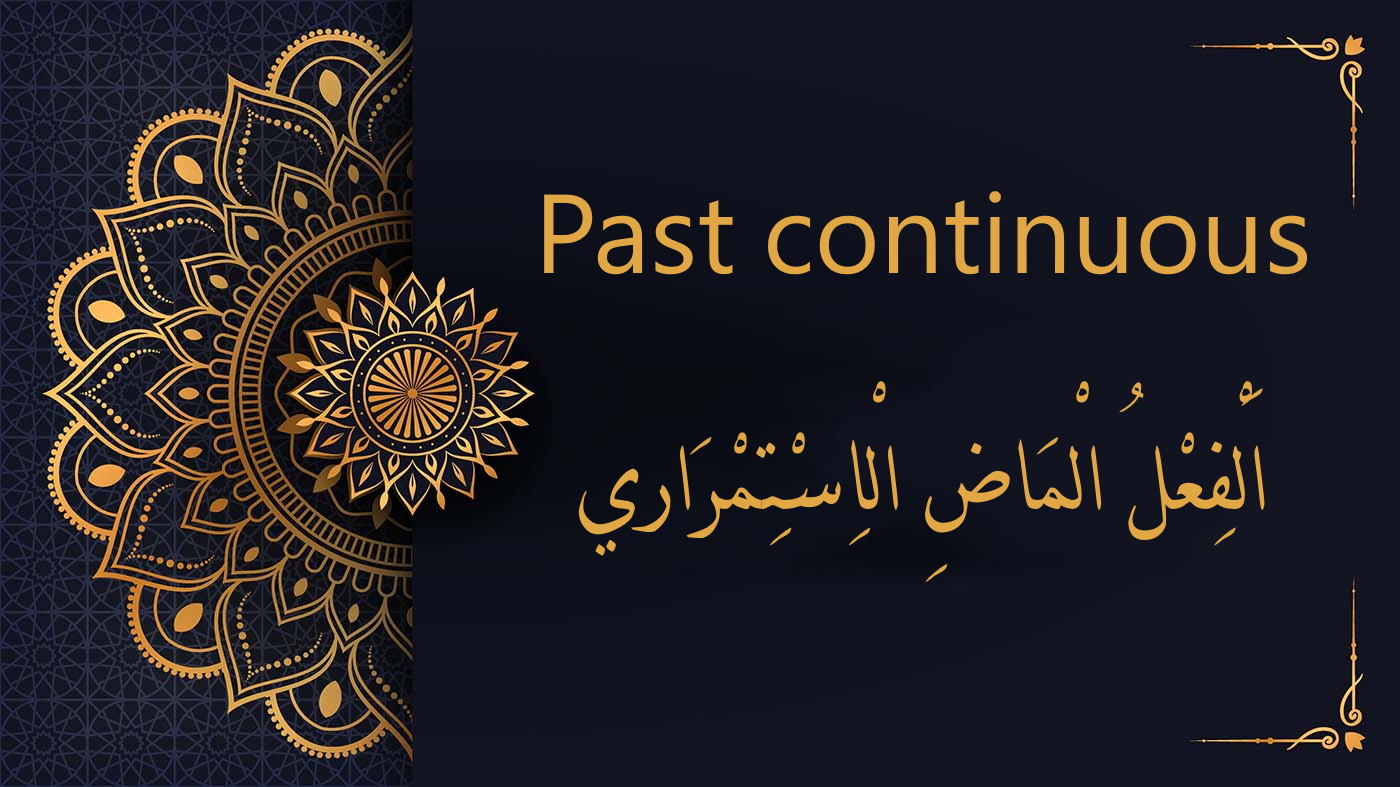Past continuous in Arabic – الْفِعْلُ الماضِي الاِسْتِمْرَارِي | Free Arabic Course

Past continuous in Arabic - الْفِعْلُ الماضِي الاِسْتِمْرَارِي
Introduction
In Arabic, the Past Continuous tense is formed by using the helping verb كَانَ (kana), which means “was” or “were,” followed by the imperfect tense of the main verb. This tense is used to describe actions that were ongoing or in progress in the past. Let’s explore how this tense is constructed:
-
Use of كَانَ (kana): The helping verb كَانَ (kana) is the equivalent of “was” or “were” in English. It establishes the past timeframe for the action.
-
Imperfect Tense: Following كَانَ (kana), we use the imperfect tense of the main verb to describe the action that was ongoing. The imperfect tense indicates that the action was not completed but was in progress.
Let’s illustrate this with an example:
- كَانَ يَقْرَأُ (kana yaqra’u): He was reading.
- Here, كَانَ (kana) signifies “was,” and يَقْرَأُ (yaqra’u) represents the imperfect tense of the verb قَرَأَ (qara’a), which means “to read.” Together, this phrase conveys the idea that someone “was reading” in the past, indicating an ongoing action.
This construction allows you to express past actions that were continuous and unfolding. Whether you want to narrate a story, describe an event, or provide context for a past situation, mastering the past continuous tense in Arabic is essential for effective communication. Join our free Arabic course to delve deeper into this and other Arabic language concepts.
كانَ يَفْعَلُ
He was doing
1. Past continuous conjugation of كانَ يَفْعَلُ
3rd person masculine
Singular
كَانَ يَفْعَلُ
He was doing
Dual
كَنَا يَفْعَلانِ
They both were doing
Plural
كانُوْا يَفْعَلُونَ
They all were doing
3rd person feminine
Singular
كَانَتْ تَفْعَلُ
She was doing
Dual
كَنَتَا تَفْعَلانِ
They both were doing
Plural
كُنَّ يَفْعَلْنَ
They all were doing
2nd person masculine
Singular
كُنْتَ تَفْعَلُ
You were doing
Dual
كَنْتُمَا تَفْعَلانِ
You both were doing
Plural
كَنْتُمْ تَفْعَلُوْنَ
You all were doing
2nd person feminine
Singular
كُنْتِ تَفْعَلِيْنَ
You were doing
Dual
كَنْتُمَا تَفْعَلانِ
You both were doing
Plural
كُنْتُنَّ تَفْعَلْنَ
You all were doing
First-person (masculine/feminine)
Singular
كُنْتُ أَفْعَلُ
I was doing
Dual
–
Plural
كُنَّا نَفْعَلُ
We were doing
In Arabic, the conjugation of كَانَ (kana) is in the past tense, even though it is commonly used in conjunction with the imperfect tense يَفْعَلُ (yaf’al). This combination allows us to create the Past Continuous tense, which is used to describe actions that were ongoing or in progress in the past. Let’s explore this further through examples:
Example :
ذَٰلِكَ بِمَا عَصَوا وَّكَانُوا يَعْتَدُونَ
That was because they disobeyed and were [habitually] transgressing. (2:61)
وَأَن تَصُومُوا خَيْرٌ لَّكُمْ ۖ إِن كُنتُمْ تَعْلَمُونَ
But to fast is best for you, if you only knew. (2:184)
كَانَا يَأْكُلَانِ الطَّعَامَ
They both used to eat food (5:75)
وَقَالُوا لَوْ كُنَّا نَسْمَعُ أَوْ نَعْقِلُ مَا كُنَّا فِي أَصْحَابِ السَّعِيرِ
And they will say, “If only we had been listening or reasoning, we would not be among the companions of the Blaze.” (67:10)
Conclusion
This lesson on Arabic nuances concludes here. Insha’Allah, our subsequent session will delve into the imperfect tense in Arabic.
Al-dirassa Institute invites you on a linguistic journey with our expert teachers to master the Arabic language. Should you wish to further your studies, we welcome your inquiries.
Chosen and Trusted by Thousands of Satisfied Learners
Discover the experiences of our delighted clients who have thoroughly enjoyed utilizing this standout feature.
Alhamdulillah I‘m very pleased with the arabic and Qur’an lessons I receive from teacher Umm Tasneem and I‘m also content with the al-dirassa administration team who were very quick in answering any questions I had. In a month I progressed a lot and I cannot wait to continue my studies with al-dirassa. May Allah reward everyone at al-dirassa.
Verified review - view original
My Qur’an teacher is fantastic, she teaches me in a loving and kind way where I look forward to the lessons and learn so much. My Arabic teacher is equally as nice and has a lot of patience with me, she has great expertise in the field and I’ve progressed really quickly with her. Thank you Al-dirassa!
Verified review - view original
Book your free trial lesson
Don’t want to go through the translation anymore?
30 free minutes with your qualified Egyptian teacher.




